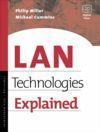Description
LAN technologies explained
Authors: MILLER Philip, CUMMINS Michael
Language: English
Subject for LAN technologies explained:
Approximative price 70.62 €
Subject to availability at the publisher.
Add to cart
Publication date: 01-2000
744 p. · 18x23.5 cm · Paperback
744 p. · 18x23.5 cm · Paperback
Description
/li>Contents
/li>Readership
/li>Comment
/li>
LAN Technologies Explained is an incredibly comprehensive and easy-to-read tutorial. It authoritatively describes the protocols, techniques, products and concepts that enable an organization's computer and data networks to carry ever-greater volumes of data at ever greater speeds. LAN Technologies Explained guides readers from traditional access methods such as Ethernet and Token Ring through the latest high-bandwidth technologies, including Gigabit Ethernet. The book's easy-to-read approach makes complex technologies and concepts accessible to both new and experienced networking professionals. LAN Technologies Explained features detailed descriptions of fundamental networking devices, including bridges, switches and routers. Practical, comprehensive, and authoritative, LAN Technologies Explained is the ultimate resource for any technical professional involved in networking.
Section 1: Ethernet: Media Access Control, PLS and AUI, 10Mbps Medium Attachment Units, 10Base-F, 10Mbps Repeaters, 100Base-Tx and Fx, Gigabit Ethernet, Auto-Negotiation, Full Duplex, 802.3 Variants, 100VG-AnyLAN, Bridges and Switches, Section 2: Token Ring: The Physical Layer, The MAC Layer, Ring Management, Source Route Bridging, Dedicated Token Ring, High Speed Token Ring, Section 3: FDDI: Physical Medium Dependent (PMD), Physical Layer Protocol (PHY), Media Access Control (MAC), FDDI Ring Operation, Station Management (SMT), Bridging in FDDI Networks, Section 4: Logical Link Control (LLC), Section 5: Routing: IP Addressing, The Internet Protocol, Routing Principles, IP Routing Protocols, IPX, Layer 3 Switching, Section 6: Cabling: Original LAN Cabling Implementations, Structured Cabling Systems, Appendixes: Vendor Identification, Ethernet Type Codes, Glossary of Networking Terms, Bibliography
Network administrators, engineers and managers
very clear, good progression of topics
© 2024 LAVOISIER S.A.S.
These books may interest you

Third Networks and Services 192.08 €

Simulation of Local Area Networks 220.72 €

